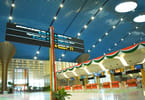The data experts conducted comprehensive research on the cybersecurity risks associated with public Wi-Fi at both airports and railway stations. The findings reveal alarming statistics and insights.
Every day, millions of people use public Wi-Fi networks at airports and train stations, seeking convenience and entertainment while they travel. However, these networks often lack proper security measures, leaving users exposed to a wide range of cyber threats.
The startling statistics: Latest research shows that up to 75% of public Wi-Fi networks at airports and train stations are vulnerable to cyber-attacks, while 1 in 3 users have shared sensitive information, such as passwords and financial data, over these unsecured networks.
The various cyber threats associated with using public Wi-Fi at airports and train stations, include data interception, man-in-the-middle attacks, and malicious hotspots.
Below are some of the best practices for staying safe whilst using public Wi-Fi networks at airports or in any other public space:
- Use a VPN (Virtual Private Network): A VPN encrypts your data and routes it through a secure server, making it more difficult for cybercriminals to intercept or access your information.
- Enable two-factor authentication (2FA): Whenever possible, enable 2FA on your accounts. This adds an extra layer of security by requiring a second form of verification, such as a text message or authentication app, in addition to your password.
- Keep software and apps updated: Regularly update your operating system, web browsers, and apps to ensure you have the latest security patches.
- Avoid using public Wi-Fi for sensitive activities: Refrain from accessing or sharing sensitive information, such as online banking or personal identification, when connected to public Wi-Fi networks.
- Use HTTPS websites: Make sure the websites you visit use HTTPS, which indicates that the data exchanged between your device and the website is encrypted.
- Turn off file sharing and Wi-Fi when not in use: Disable file-sharing options on your device and turn off Wi-Fi when you’re not using it to prevent unauthorized access to your files or device.
- Use antivirus and firewall software: Install reliable antivirus software and enable a firewall on your device to protect against malware and other threats.
- Be cautious of public charging stations: Cybercriminals can exploit public charging stations to install malware or steal data from your device. Use your own charger and plug it into a wall outlet or use a portable power bank.
- Beware of fake Wi-Fi hotspots: Verify the legitimacy of a public Wi-Fi network before connecting to it. Cybercriminals often create fake hotspots with similar names to trick users into connecting.
- Use strong, unique passwords: Create strong, unique passwords for each of your accounts and avoid using the same password across multiple platforms.
By following these best practices, you can significantly reduce the risk of becoming a victim of cyber-attacks whilst using public Wi-Fi networks.
WHAT TO TAKE AWAY FROM THIS ARTICLE:
- This adds an extra layer of security by requiring a second form of verification, such as a text message or authentication app, in addition to your password.
- Latest research shows that up to 75% of public Wi-Fi networks at airports and train stations are vulnerable to cyber-attacks, while 1 in 3 users have shared sensitive information, such as passwords and financial data, over these unsecured networks.
- A VPN encrypts your data and routes it through a secure server, making it more difficult for cybercriminals to intercept or access your information.























